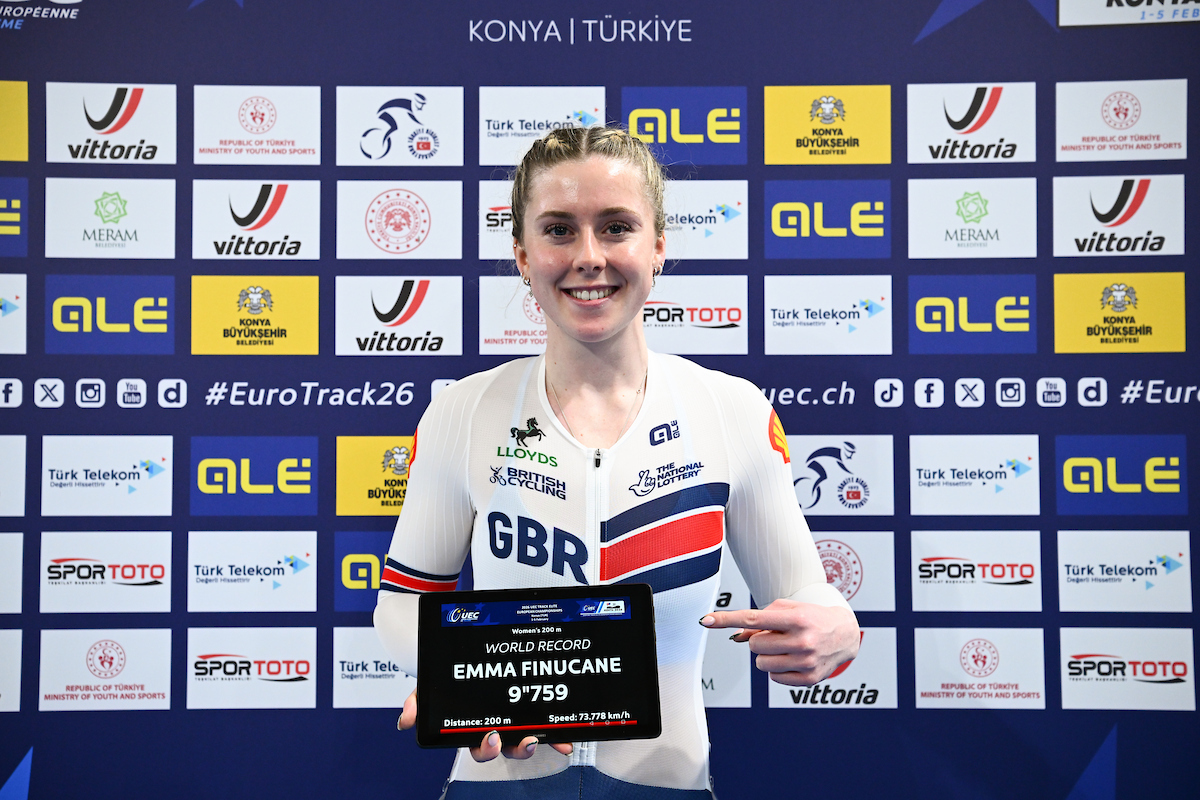Robert Gesink: Dutch courage at the Vuelta
In his third Grand Tour start, injured Dutchman lies second overall with four days to go.
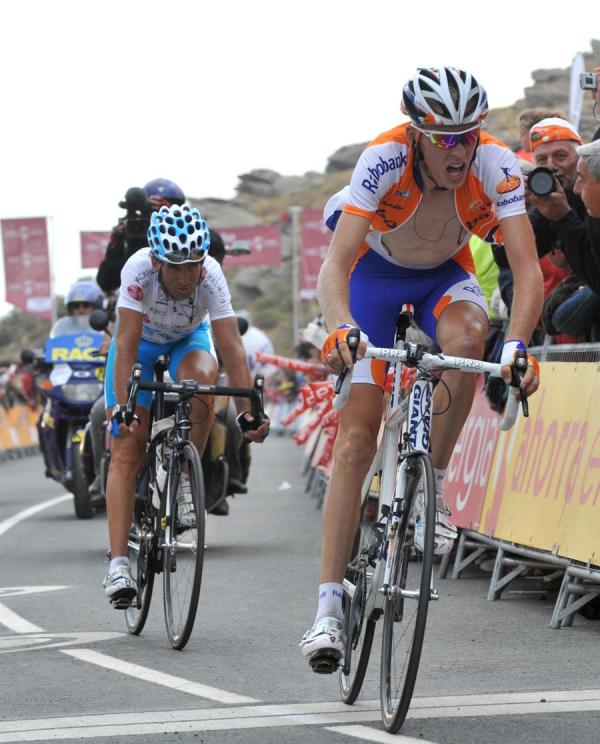
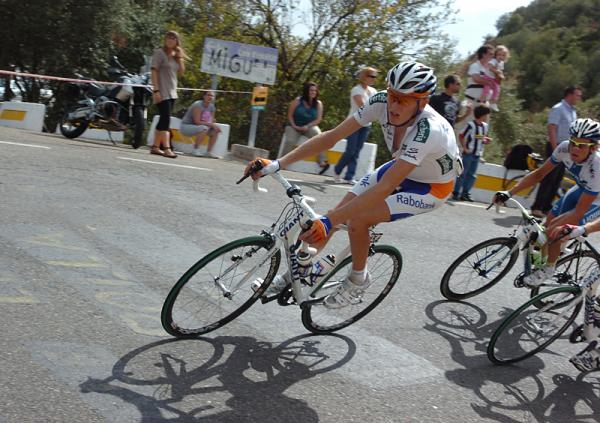
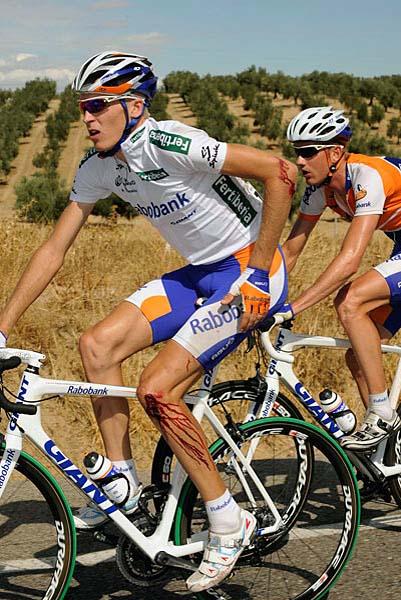
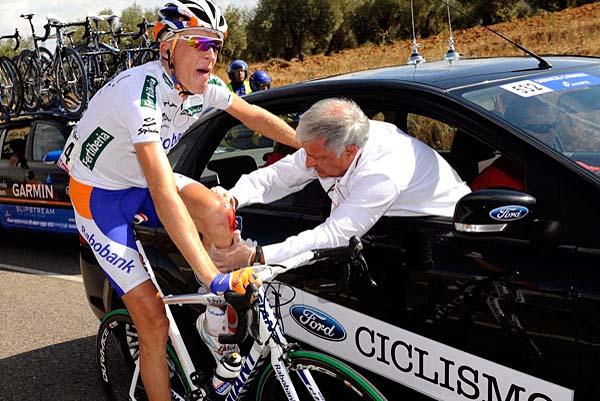
Rabobank’s Robert Gesink crossed the finish line at the end of Wednesday’s 17th stage of the Vuelta a España with a large white bandage on his left leg and blood seeping through the cloth. It was a frustrating moment for the talented 23-year-old, who had already crashed out of the Tour de France this year. He was one of several riders who hit the deck 126 kilometres into the stage to Talavera de la Reina and, together with a concussed Ezequiel Mosquera, the most badly injured.
Both riders went to hospital after the stage for assessment. Mosquera was cleared to ride and so too Gesink, although the latter's team stressed that his continued participation in the race was entirely dependant on how his injuries held up on today’s stage to Ávila. Gesink’s knee injury was deep enough that the tendons could be seen under his skin and, with other injuries to his back, arm and buttocks, he is certain to have had a rough night’s sleep.
However, the Dutchman is made of tough stuff and he’ll brave it out as best as possible on today’s rain-washed stage. If he can finish it, he’ll do that; if he can take time out of Alejandro Valverde (Caisse d’Epargne) along the way, he’ll certainly seize the chance. Gesink’s excellent Vuelta a España has seen him ride strongly in the mountains and head into the final four days just 31 seconds adrift of Valverde in the general classification.
Cyclingnews spoke to Gesink immediately prior to the start of Wednesday’s stage 17, asking him about his season, his Vuelta and his thoughts on the days ahead.
Cyclingnews: You are 31 seconds behind Alejandro Valverde in the general classification - can you make up that time in the days ahead?
Robert Gesink: It is really complicated, but if I feel like it is possible then I will try. Tomorrow they predict really bad weather for the stage to Ávila and so it will be tricky – it is already a tricky stage in itself. Of the days after that, I think that Navacerrada is also really difficult, although it is not a mountain-top finish, which I’d like.
CN: How is your descending?
The latest race content, interviews, features, reviews and expert buying guides, direct to your inbox!
RG: It’s fine, you can see that in the last few days…it shouldn’t be a problem.
CN: The reason for asking is that a lot of people are talking about Samuel Sánchez’s attempt to win the race, saying that perhaps he could make up some time on the drop to the finish. Is it the case that he’s so much faster that the others on descents, or is it exaggerated?
RG: I think it is exaggerated. He is just a little bit crazier than the other riders. I think a lot of the guys want to be safe and respect each other’s health, but he is somebody who doesn’t care about that and just goes full out on the descent. It means that maybe a lot of people crash because of that, but he doesn’t mind that.
He has every right to do it: to attack on the descent. But I don’t think he necessarily endears himself to the rest of the peloton by doing that.
CN: You have a time trial on Saturday. Do you expect to lose time to Valverde, maintain the gap, or make up time?
RG: Well, a time trial after three weeks is always different than a time trial in the beginning of the race. I hope to have a really good day there and do good business, but it will be really difficult. That is one thing that is certain.
I think for me it is already a really big thing to be here in second position at this moment.
CN: It has been obvious for quite some time that you were going to be a contender in future Grand Tours. Is this sooner than you thought it would be?
RG: Yes, maybe it is. Sometime things go a little bit better than you expected, and this is one of those times. I am happy the way [my career] is going, and I didn’t really expect it to go like this so soon. It is a good thing!
CN: How was the rest of the season for you?
RG: Quite good. I had some back luck. I had a really good Amstel Gold race but afterwards I had a little injury and problems with that. Of course, the crash in the Tour [de France] was a really big disappointment. But I performed really well otherwise – the Dauphiné was really good, I think. I wanted to do a really good Tour but that didn’t happen.
CN: You had to pull out of the Tour…
RG: Yes, I broke my left wrist. After a week I was riding the bike again, using a cast around it. I did altitude training in San Moritz afterwards for three weeks, and then I did two races before coming here.
CN: What about the worlds? Mendrisio is a hard course and is expected to suit riders who are good climbers…
RG: Yes, that is my next goal. I was checking it out when I was in San Moritz; Mendrisio was pretty close to there. The course is really difficult, I think, and will probably be similar to last year.
CN: Who do you think will be your rivals there?
RG: I think a lot of guys who are riding here....guys like Cunego and Ballan have really good chances.
A rapid progression
At 23-years-of-age, Robert Gesink has quickly emerged as one of the biggest talents on the block since turning professional with Rabobank in 2007. The Dutchman had originally joined the Continental squad in 2006 on a two year deal but the quality of his early results saw him move to the ProTour team one year early.
Gesink hit the ground running, he rapidly built on amateur results that included second overall in the Tour de l’Avenir. He won the young rider’s jersey in the Tour of California and finished ninth overall in his first-ever ProTour race, La Flèche Wallonne. That form led on to his first pro victory on stage four of the Tour of Belgium, plus other excellent debut season results such as thirteenth in the Tour de Romandie, second in the Tour of Poland, fifth overall in the Deutschland Tour and the best young rider award there.
Year two was even brighter, with a stage win, ninth overall and another best young rider award awaiting him in California. He finished second on the Mont Serein stage of Paris-Nice and seized the leader’s jersey, but had to be content with fourth overall and the best young rider trophy after Davide Rebellin distanced him on the penultimate stage to Cannes. Twelfth in the Vuelta a Pais Vasco, fourth in Flèche Wallonne and seventh overall in his debut Grand Tour, the 2008 Vuelta, all followed later that year.
He’s continued his progression in 2009 despite some injuries. Eighth overall and best young rider in the Tour of California was followed by seventh in the Vuelta al Pais Vasco and then a superb third in the Amstel Gold Race. He prepared for the Tour de France with fourth overall plus second on a stage in the Dauphiné Libéré, but crashed out of his first Tour in the team time trial.
Gesink recovered from the broken wrist suffered in France and has been riding extremely strongly in this edition of the Vuelta, netting a run of top-five finishes on mountain stages. He starts stage 18 of the Vuelta in second place overall and, providing his injuries are not too severe, will do his utmost to overturn Alejandro Valverde’s 31 second advantage on the two remaining mountains stages.
